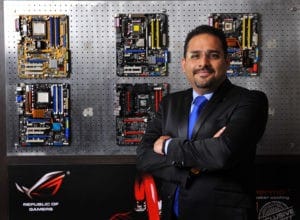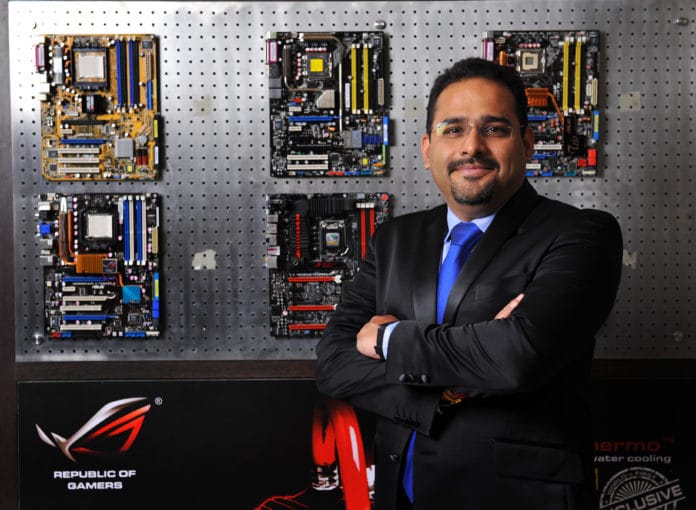The Internet of Things (IoT) is emerging as the third wave in the development of the Internet. Vinay Shetty, regional head – ASUS Technology Pvt Ltd – India and South Asia in an interaction with Electronicsforu.com Network shares how ASUS is gearing up to embrace the wave of the IoT revolution. Excerpt follows…

Q) Many opine that IoT is just a buzzword that industry Gurus have coined to create hype? Do you agree with that line of thought?
No. IoT isn’t something that is new but the reason it may seem like a trending topic now in the technology world is because we have several products that we call ‘smart devices’ and the ecosystem of manufacturing and start-ups are focusing on this as a vertical for steady growth and surely it is opening a new market and opportunity
Q) In your opinion, is the Government of India (GoI) playing any significant role in expanding the IoT market right now?
The government is pushing aggressively for e-governance, smart city projects and digital transformation thus opening several opportunities that are attracting IoT players to invest in the Indian market. The use of IoT in the recent past has grown phenomenally high because of such an active endeavor.
Q) What are your expectations from the GoI in terms of the initiatives they should take to make India an IoT-super power?
When we talk about being a superpower – what needs to be considered first is the consumption backed by a solid infrastructure to be self-sufficient by providing a conducive environment for R&D, manufacturing and facilitation of export to the world. The investment norms should be relaxed for Indian companies and overseas companies to invest in India for R&D and manufacturing. This, in turn, will pave the path for India’s road to supremacy.
Q) Are you satisfied with the rate of deployment of IoT solutions in India?
Currently, the interest and progress is fairly decent, but the key is sustainability. Start-ups and organisations need to build sustainable solutions backed by an equally sustainable business model.
Q) How do you see the IoT market evolving in the next 2-3 years?
With our lives being fully dependent on smart devices and the digital world now, there is a massive scope for innovation and disruption in the field of medicine, hospitality, automation, robotics and many other fields.
Q) Which industry segments do you believe will be driving a larger chunk of demand?
It is difficult to forecast this because every industry sees a huge potential in adapting to IoT with robotics playing a significant role in it. Having said that, the automobile and pharmaceutical industry will take the lead.
Q) What’s your bigger challenge–acquiring customers or acquiring talent?
Currently, the challenge is acquiring talent. Linking with the top engineering and biotech colleges remains our focus to pick talent.
Q) What is the estimated revenue of your biz that you’d attribute to IoT-related business?
Currently, it is very nascent to even put a number to the IoT business.
Q) How do you see your IoT-related business growing in the next 2-3 years both in terms of revenue and as a fraction of your overall revenues?
With the shift to smart devices in every segment of our life, I presume the revenue would be growing by 300 per cent and the contribution to my business will be more than 10 per cent.
Q) What’s your strategy to create a differentiation for your solutions vis-a-vis your competitors?
Products that are user-friendly with loads of features with the vision of tomorrow’s utility is the key to win or lead the pack against the competition. Asus’s core strength is in R&D and Engineering. So, we foresee the users’ need and demand and work on our products accordingly.
Q) Any innovative strategy being planned or implemented by your team to create demand for your solutions amongst customers or channel partners?
Currently, the market absorbs any new innovation and solution as the utilisation is specific to select audiences and there are fewer solution providers but in the future, there will be many players and to address that we have a lot of product information sharing and pieces of training planned.
Q) Who is the key decision-maker for you–the technology decision-maker or the business decision-maker?
Business is run by both – the technology decision-maker and the business decision-maker. The advantage for ASUS being a technology product is that the technology decision-maker is thoroughly convinced on an ASUS solution being the best, making life easy for the business decision-maker to see the profit and in turn a long term commitment to a brand like ASUS.
Q) What technical upgrades or innovations are you integrating in your upcoming products?
Taking the case of the ASUS Lyra voice as an example. ASUS can bring integrate different technologies to make a consumer’s life easy. The market doesn’t have such a solution of a router with a Bluetooth option and Alexa together – this changes the entire solution outlook for the end-user who always wants a compact solution for adding it in his current home solution without too many cables and wires.










